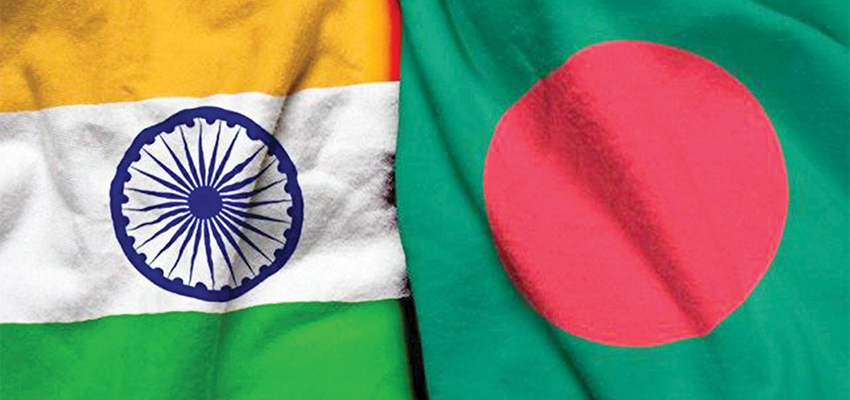Hot Coals on the East

The recent coup in Bangladesh and the violent aftermath have serious implications for India, considering that it is unlikely that the new regime there is pro-India. The repercussions have bearings that are military, economic, and humanitarian. India will need to tread carefully on these new hot coals
On 5th August, Bangladesh underwent a massive change and Sheikh Hasina, the Prime Minister of the country, since January 2009 was ousted, following a massive protest. The turbulence in the country started with a protest by the students against reservation in jobs following a High Court order, which upheld the government policy that gave 30 per cent reservation to the children and grandchildren of freedom fighters. There was anarchy in the country and hundreds of protesters got killed in the police action. The matter was taken for diffusion by the Supreme Court and it reduced the reservation to 7 per cent.
The agitation did not subside. On the contrary, it got recharged by the joining of various groups, both political and Islamist extremists. Lakhs of people marched to Dhaka and then towards the residence of the Prime Minister. The blood-bath kept on increasing and then on the advice of the army, Sheikh Hasina resigned and to protect herself she fled to India for a short stay, until she got asylum in any other intended country.
Today, she is in an unknown safe place in Delhi and has still not got any political asylum in any of her intended countries. Her life was really saved as within minutes after her departure, the crowd reached her palace and ransacked it.
The other contributing factor to the massive protest was her election in January 2024, in which she got elected for the fourth time. This election was boycotted by the opposition, and many of the opposition leaders were in jail. The opposition was waiting for the right moment to take revenge on her, and the movement against reservation worked as the right moment.
After the ouster of Sheikh Hasina, an interim government has been formed headed by Nobel laureate Mohammad Yunus as its chief advisor, along with an ad hoc team, and supported by the army.
India is worried for various reasons. India did not delay in permitting the stay of Sheikh Hasina in India due to the country’s relationship with her and also with Bangladesh. Sheikh Hasina through her son has stated that the apparent reasons for the turbulence in the country are not the real ones. The real reasons, according to her, are her disobedience of the US, as she did not approve their proposal to set up an air base in St. Martin island in Bangladesh. This fact was hinted by her earlier too, when she talked about a problem with a ‘white man’. All of us in India are concerned with the atrocities against Hindus, which roughly, makes up a population of about 1.2 crores (7.5 % of the population). Temples and homes of Hindus have been burnt and even their personal security is at stake. There is an anti India sentiment prevailing in that country, probably due to our good relationship with Sheikh Hasina.
Historical background
Bangladesh, like Pakistan, was a part of India until the partition in 1947. It became a part of Pakistan, and was named East Pakistan after partition. It gained independence from Pakistan in 1971 and was named Bangladesh. This was after a long struggle for autonomy from Pakistan. East Pakistan used to suffer, as West Pakistan (now Pakistan) was dominating it both politically and economically. Thousands of miles of distance between the two countries also worsened the problem despite the fact that East Pakistan had a larger population.
In the elections of 1970, Sheikh Mujibur Rehman, leading the Awami League emerged victorious and this meant that they would form the government in Pakistan. West Pakistan was not prepared for this. This led to demonstrations in Dhaka and the same were met by mass killings and brutal crackdown by the army. This in turn sparked the Bangladesh Liberation war. Millions fled their homes, creating a huge refugee crisis in India. Under the leadership of then Prime Minister, Indira Gandhi, India took swift action and intervened to resolve the crisis, our army was sent and it became the India-Pakistan war of 1971.
Pakistan was defeated, and Bangladesh got independence on 26th March, 1971. Sheikh Mujibur Rehman became the first Prime Minister of Bangladesh. But in 1975, he along with some members of his family met a tragic end in a military coup. His two daughters including Sheikh Hasina survived as they were out of the country during the assassination bid. The sisters remained in exile and in 1981 Sheikh Hasina came back to the country and started leading the Awami League party.
She led the struggle against President Zia ur Rehman and the military authoritarianism. She won the election and ruled as Prime Minister from 1996-2001 after the assassination of Zia ur Rehman. Later Khalida Zia, the widow of Zia ur Rehman and head of the BNP won the election in coalition with some other parties. Sheikh Hasina was arrested and sent to jail on some fake charges. She won the election again in 2008 and became Prime Minster in 2009, and since then she has continued in her post winning successive elections until her recent ouster.
Implications for India:
- India cannot remain unaffected from the present crisis in Bangladesh. We have a 4156 km border and most of it is porous. If there is a friendly government on the other side, then we do not need to spend more to guard it except for the normal vigil by the Border Security Force. The situation was better with a friendly Sheikh Hasina government there. Now with a hostile atmosphere on the other side, we may have to devote more time, depute more forces and even have to fence our borders, which will increase our expenditure.
- With the disquiet on the eastern front, there are chances of refugees crossing into our country. We already have a large number of Bangladeshis illegally settled in different parts of our country, particularly in Assam and Bengal. At the same time it may be difficult to avoid the people who want to come due to the hardships and persecutions there, on humanitarian grounds
- Bangladesh is our largest export market in South Asia, and a problem there will definitely affect us. In the preceding fiscal year, our export was to the tune of $ 11.1 billion. The majority of these exports are from labour intensive sectors and hence any loss in it may also affect our job market.
Considering the conduct of China and Pakistan, there is always a possibility that they will try to fish in the troubled waters of Bangladesh to create problems for us. Now there can be infiltration of terrorists, arms and drug smuggling from the eastern side too

- Considering the conduct of China and Pakistan, there is always a possibility that they will try to fish in the troubled waters of Bangladesh to create problems for us. Now there can be infiltration of terrorists, arms and drug smuggling from the eastern side too. Today, our huge army is deployed on the western front with Pakistan and the northern front with China and now we may have to guard our eastern front in a similar way.
- Hasina has been a secular leader and so has been her party (Awami League). Now, after the interim government, the country may go into the hands of the BNP and Jamaat-e-Islami, who are known for their hatred against India and softness for Pakistan and China. The atrocities against Hindus there may increase and this will have a cascading effect on social harmony in our country.
- India has been following a foreign policy of ‘Look East’ and Bangladesh was to be our entry gate for this policy. India will now be constrained to recalibrate this policy with the crashing of our gate to the east.
Bangladesh, post Hasina’s ouster:
- Bangladesh had emerged as a strong economy during Hasina’s period, mainly due to its political stability and export of garments. This may create a serious dent if there is any delay in the formation of a stable and reform oriented government. During the past few years until Covid, the average GDP growth rate had been 6.3% along with good human-index (HDI) parameters.
- Bangladesh used to rely on India for cotton for its garment exports and also for food items. Bangladesh being bordered on all three sides by India, if its relationship with India deteriorates, then it will have to spend more to get its needed raw material and food items from elsewhere, spending more on transport. Post Covid, its economy has been on the decline and it is not in a position to take hard decisions.
- Post Hasina, there is growing social strife in the country. Awami League partymen and minorities are being attacked. There is a search going on in the country to locate well wishers of Hasina and they are being physically targeted. Even Supreme Court judges and the Chief Justice have resigned and new judges have been appointed.
- The interim government has so far not announced as to when elections will take place. There is an air of doubt and suspicion in the country
India post Hasina
- Prime Minister Modi was among the first to extend good wishes to Yunus on his nomination as the chief advisor. India has extended its co-operation for good relationship between the two countries to continue. India will however, remain concerned about the plight of Hindus and other minorities there.
- India will remain vigilant about the rise of terrorism and other illegal activities from across its eastern border.
We all know that nothing is permanent except change. With the change now in Bangladesh we have to take a fresh look at our foreign policy. Neighbours cannot be changed and hence we will have to do our best to be good friends with them. However, if friends or neighbours decide to be hostile, then we will be compelled to reply in their own language.